|
Advocate, Lyricist, Editor and Proprietor of
The Glasgow Herald
Author of 'Legal And Other Poems'
George Outram was born on the 25th of March, 1805 in New Monkland and
Coatbridge Parish to Elizabeth Knox (1779-1866) and her husband Joseph
Outram (Manager of Clyde Ironworks). In the course of a year or two,
however, the family removed from Lanarkshire to Leith, Mr Outram, Sen.,
having become a partner in a mercantile house there. in 1937, George
married a Jamaican born, British Subject, Frances McRobbie in Edinburgh.
George died in the Parish of Dunoon and Kilmun in 1856, and Frances died
in Edinburgh in 1880.
George Outram (1805–1856), humorous poet, was
a Scottish advocate, a friend of Professor Wilson, and for some time editor
of the Glasgow Herald. He printed privately in 1851 Lyrics, Legal and
Miscellaneous, which were published with a memoir in 1874. Many of his
pieces are highly amusing, the Annuity being the best.
An Introductory Appreciation to 'Legal And
Other Lyrics'
by
Henry Glassford Bell, the then Sheriff of Lanarkshire
George received his early education in the
High School of Leith and afterwards went through the regular curriculum
of the University of Edinburgh. In 1827 he became a member of the
Faculty of Advocates, and for the next ten years continued to attend the
Parliament House, where his genial disposition and fund of quaint humour
made him a great favourite with both Bench and Bar. Being, however, of a
retiring, sensitive, and not over-active nature, Outram did not lay
himself out with much earnestness for legal practice; and in1837 he
accepted the offer, somewhat unexpectedly made to him of the editorship
of the Glasgow Herald, then, as it has since continued to be, the
leading newspaper in the west of Scotland. He also became one of the
proprietors, and settled down to his new duties for life. The Glasgow
Herald, at that time, was published only twice a week, and was conducted
in a steady, quiet, and unpretentious manner, with a careful avoidance
of anything like an aggressive or innovating spirit. ln politics it was
mildly Conservative, but by no means slavishly so, as it rather piqued
itself on maintaining a character of independence, and was on the whole
conducted with such tact and discrimination that it secured the
confidence of the public, and increased in circulation and repute. Its
editor loved what was old and pleasant and easy, and shrank, with a sort
of humorous abhorrence, from what was novel and obtrusive, either in
social or political life. Nevertheless,when occasion required, he showed
both firmness and discrimination, and his judgment was seldom at fault
in the numerous questions which force themselves on the attention of a
public writer.
Mr Outram had married before he left Edinburgh, and in due course became
the father of four sons, in whose education and upbringing he took the
greatest possible interest, but none now survives at this time of
writing in 1887. He also had one daughter daughter, who died in infancy.
He resided, with much domestic enjoyment, in Glasgow or its
neighbourhood for nineteen years. During that period he won and
retained, by his amiable manners and delightful flow of good-natured
humour, the esteem and respect of all classes. He likewise experienced
much pleasure in keeping up his acquaintance with his old friends and
associates in Edinburgh, who had greatly regretted his separation from
them, and were always glad to receive him with open arms.
For George Outram possessed, in addition to his other qualiiications, a
spark of true and original Scottish genius, but for which the foregoing
brief summary of his uneventful life would never have seen the light.
This genius manifested itself chiefly in the production of songs and
other lyrical pieces, mostly in the Scottish dialect, and they exhibit,
without a touch of bitterness, an amount of humour hardly surpassed by
any other national writer. Many of these compositions, which were the
delight of his own circle, were called forth only by some incident or
event in the lives of some of the members of that circle; so that their
allusions and mirth-exciting power could not be rightly understood by
the outer world. Well, however, do Outram’s surviving friends remember
what additional delight many a song of his, composed for the occasion,
gave to their social symposiums. The author himself was of too modest a
nature to regard them as anything but trifles; but when a copy was
obtained, the unrepressed laughter of many a coterie in the Parliament
House, collected in some convenient nook, indicated their appreciation
of the contents.
Fortunately, however, some of Outram’s best things are of a more general
character, which appeal to,and are sure to command, the sympathies of
all. His ‘Legal Lyrics’ introduce us to some of the peculiarities of
Scottish law, and show us their comic side with a rare and genial power,
scarcely ever attempted before, and certainly never at any time
surpassed. The author’s idea in such ballads as “The Annuity,” “The
Multiplepoinding,” “Soumin an’ Roumin,” “The Process of Augmentation,”
“The Process of Wakenin’,” “Cessio Bonorum,” and others, seems to have
been to present vivid and humorous pictures, not unaccompanied sometimes
by a touch of pathos, of the peculiar and rather remarkable features of
Scottish legal process, and its effect on the character and feelings of
his countrymen. The scenes suggested are as vividly portrayed as they
could have been by the pencil of a Wilkie; and whilst perhaps they will
be most intensely appreciated by professional lawyers, they possess that
breadth of colouring and truth to human nature which cannot fail to
interest all readers, and entertain them with an exquisite perception of
the ludicrous.
Some of the miscellaneous pieces are not less stamped with originality
and humour,and it is much to be regretted that, for the reasons above
indicated, they cannot be all given to the public. It is confidently
believed, however, that among the poems in the present publication there
will be found specimens of national ‘facetiae’ differing from anything
to be found elsewhere, and full of a high merit of their own. In some
instances they are descriptive of bacchanalian characters; but, in place
of being written with any view to encourage bacchanalian habits, they
tend to expose the folly of such habits, and to turn them into ridicule.
Here and there the author’s keen sense of the ludicrous has induced a
certain freedom of expression,without which the thought would have lost
its characteristic vigour. But the consciousness of a healthy moral tone
remains throughout.
This brief Introductory Notice ought perhaps to stop here. But it has
been suggested that one or two personal reminiscences of Outram may be
added, as tending to bring out more fully the genial character of the
man and the poet. His cast of mind and associations were essentially
Scottish. He was, it is believed, only twice out of Scotland during his
life, and that but for short periods. He was admirably versed in, and
had a high appreciation of, the strength of his native Doric. He was
also familiar with the peculiarities of Scottish character, some of
which afforded him great amusement, whilst others inspired him with
respect. These features of his mind and habits led him, not long after
he went to reside in Glasgow, to conceive the idea of a " Scotch Denner,"
to be given in his own house, as a purely national meal, to which each
guest was to come in the costume of some favourite Scottish worthy, and
which was to be a gathering ironically renewing the once popular
lamentations over the Union with England, as destructive of the
independence and ancient position of Scotland. The "denner, "to which
only a small and select party was invited, each of whom appeared in an
historical character and dress, came off on 22nd July 1844, being the
138th anniversity of the 1707 Treaty of Union. It had been a great
amusement to Outram, in his leisure moments, to make arrangements for
this banquet. He printed his letter of invitation —of itself a
curiosity—a list of toasts— and, by way of menu, a small brochure, a
copy of which was supplied to each of the guests, with the motto, “Syne
there were proper stewards, cunning baxters, excellent cooks and
potingars, with confections and drugs for their deserts. “ (Pitscottie,
Edin. 1728, p. 174.) The Letter of Invitation, the List of Toasts, and
the Brochure, follow here, and are provided for the perusal of those who
may be interested by a specimen of the genial humour which habitually
pervaded the author’s social intercourse with his friends.
Latterly his constitution, which had never been very robust, gave way
somewhat prematurely, and he died at his country residence of Rosemore,
on the Holy Loch, on 15th September 1856, in the fifty-second year of
his age. He was buried in Warriston Cemetery, Edinburgh; and left behind
him, in the hearts of many attached friends, the memory of a most
kindly, amiable, and gifted man.



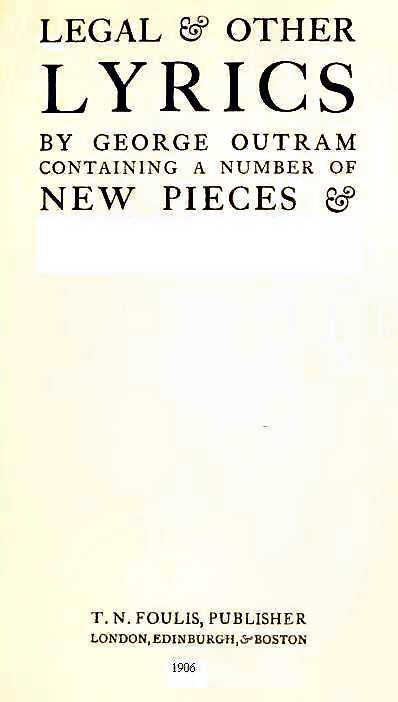
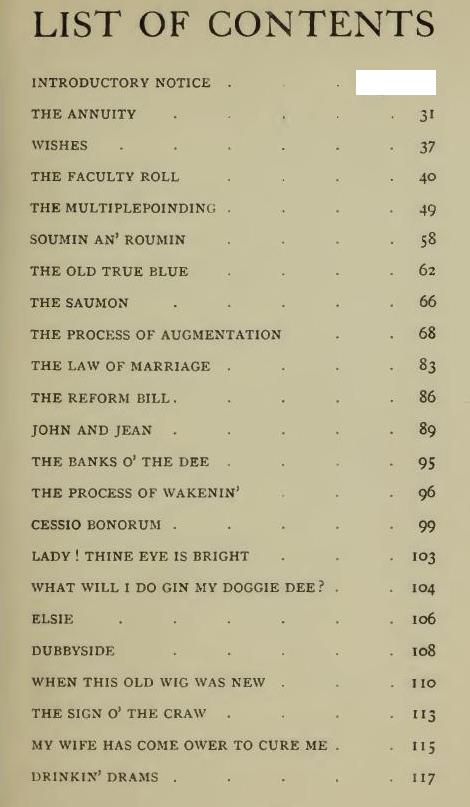

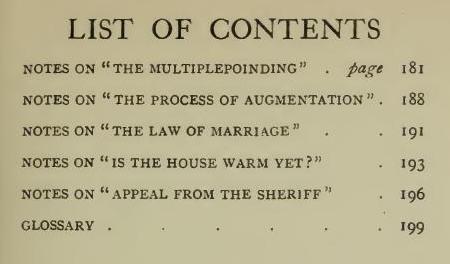
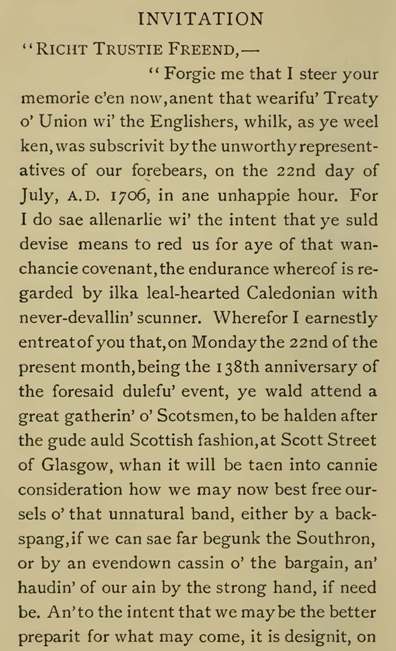
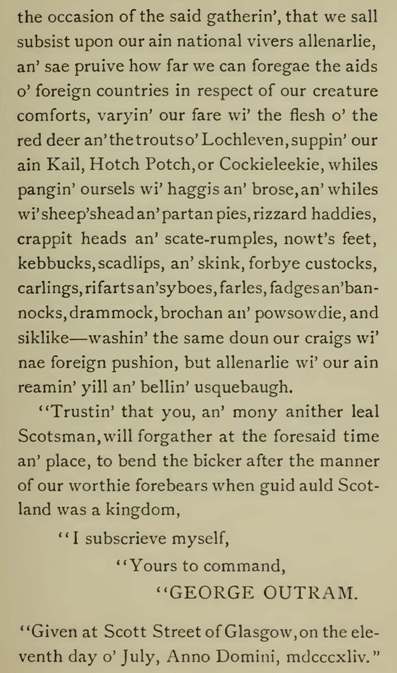
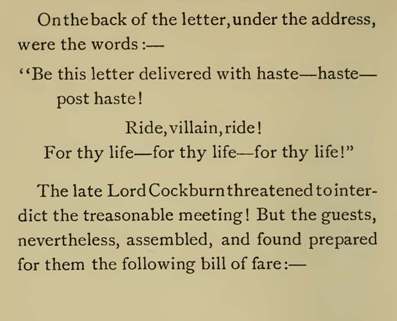
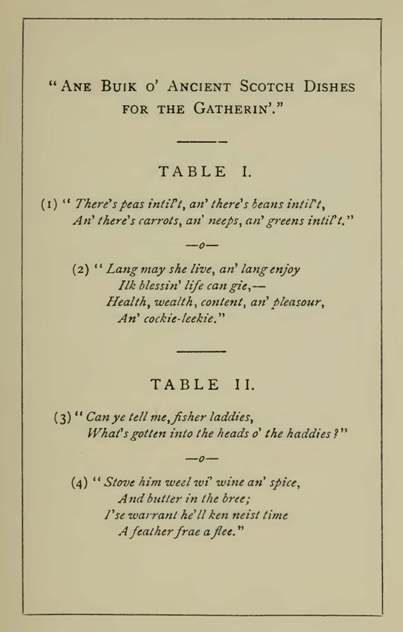
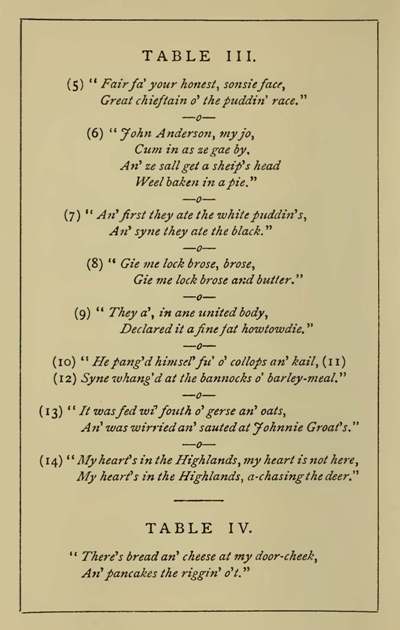
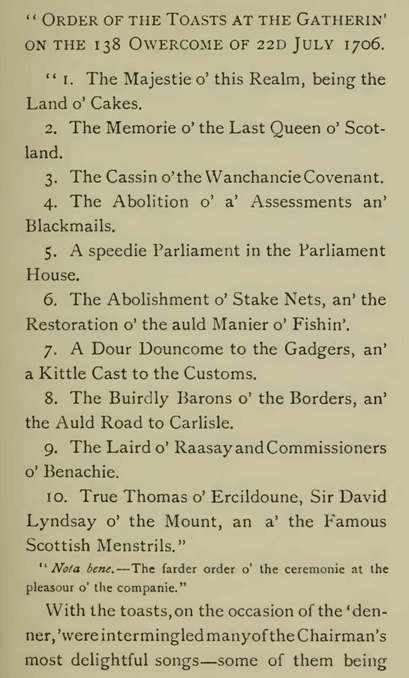
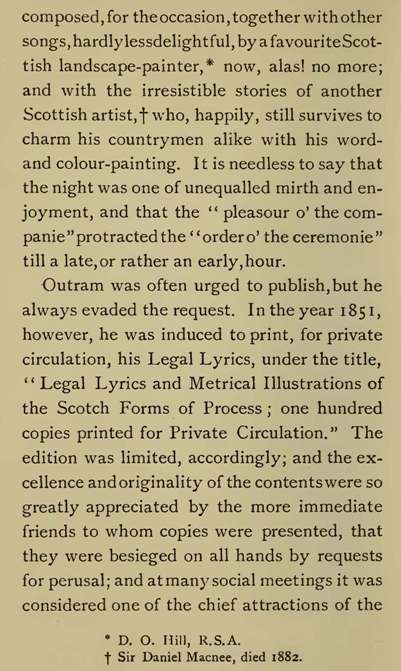
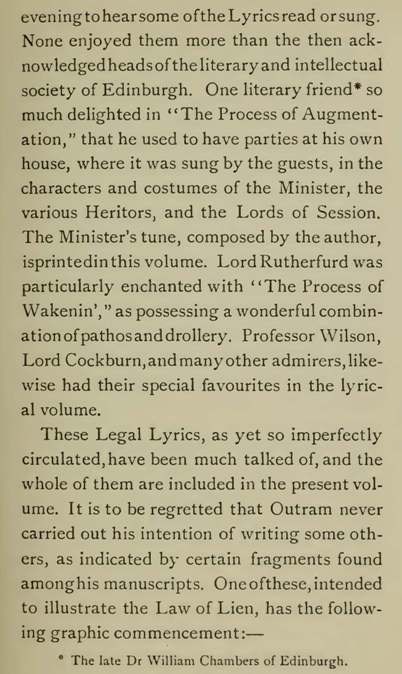
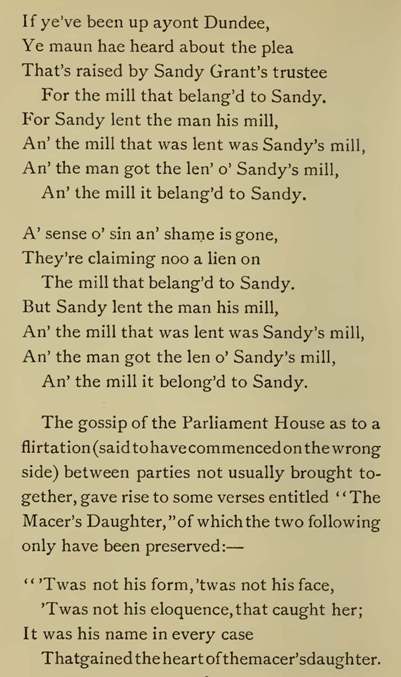
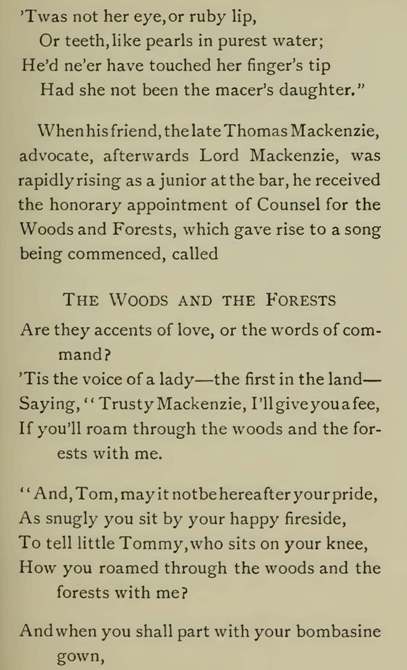
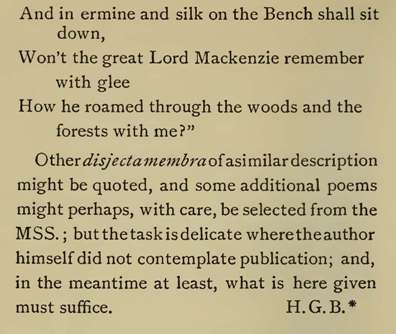
Notes on the Dinner
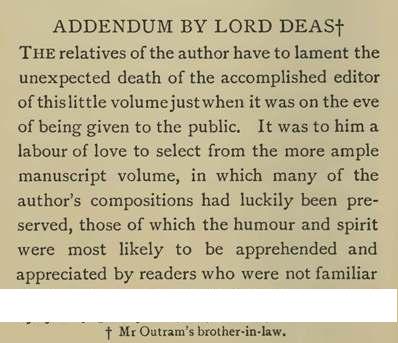
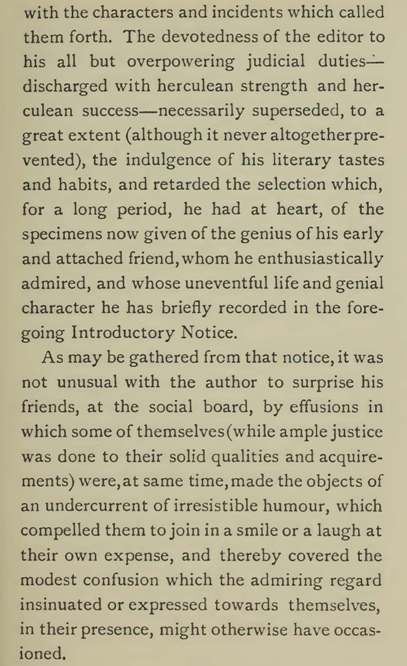
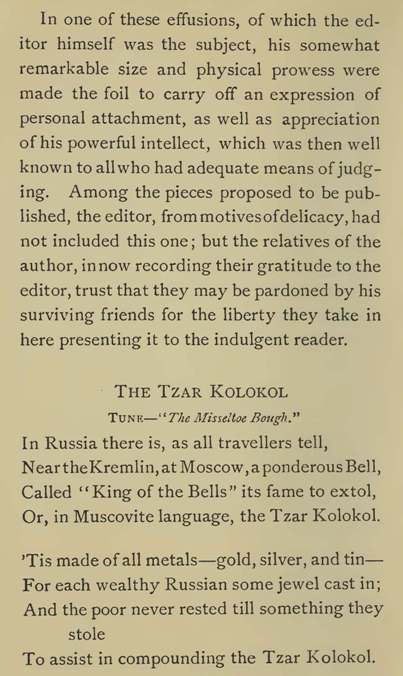
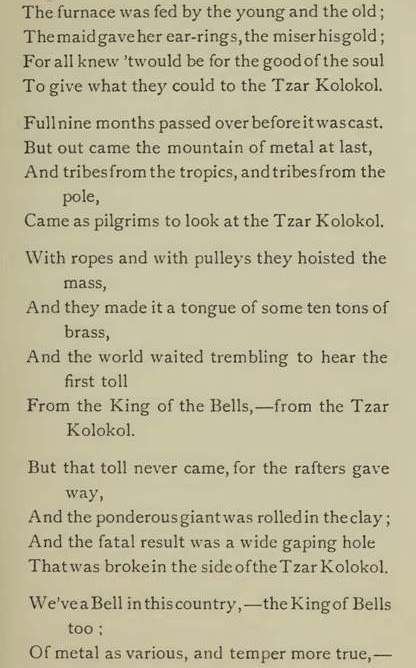
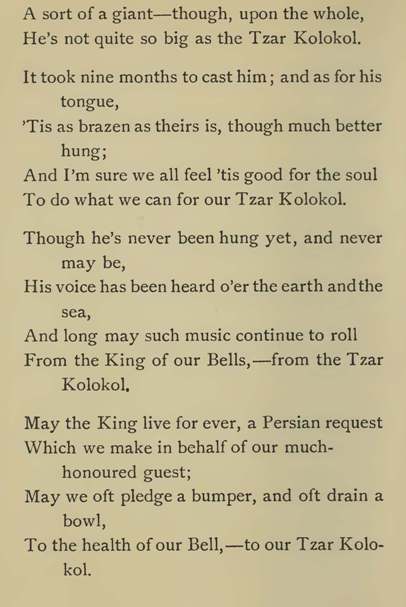
|

